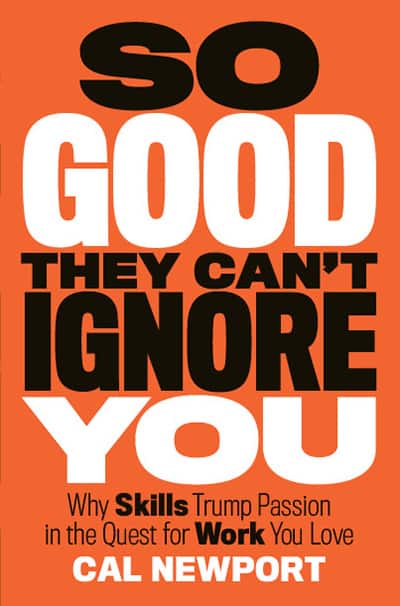“Every artist was first an amateur. “Ralph Waldo Emerson.
Today we’re going to talk a little bit about passion versus talent and finding the things that you will be great at. And I think that even though the book that we’re going to talk about today talks primarily about career, I would challenge you to think about it when it comes to how you invest your fun time even.

Today, we’re going to talk about Cal Newport’s book. So Good They Can’t Ignore You; Why Skills Trump Passion in the Quest for Work You Love. This book was written in 2012. Cal Newport has strong opinions when it comes to work and what makes you successful in work. He talks about the example of Steve Jobs. Steve Jobs, loves Zen Buddhism, that was his passion in life. And Steve talked about doing what your passion was. But that’s not really what Steve did. Steve actually didn’t follow his passion. He followed what he was good at. That’s what really earned him his fame. Cal Newport finds that passion is not something that you follow. This phrase that “Do what you love. and the money follows” is not something that you should really believe in. And over the last I would say, feels like 20 years, people have been really pressed like you have follow your passions you have, find what you love and do that. If you do what you love, you’ll never work a day in your life. And while it’s true, in the end, it’s not exactly how you get to either finding passions in your hobbies, or passions in your career, it just doesn’t happen that way. Or at least it doesn’t happen very often. So, his first part is passion is rare and often times, passion comes by getting good at something. That a lot of us don’t really have a passion for anything until we become masters of what it is we’re good at and then we fall in love with it. The quote is, “Don’t do what you love. Learn to love what you do” by acquiring mastery, autonomy, and relatedness. And when you’ve mastered something, you will be more likely to be passionate about it.

Self-Determination Theory
He talks about a scientific theory called Self Determination Theory which has three basic factors in intrinsic or internal motivations, which will bring job satisfaction. And the three feelings are Autonomy, the feeling that you have control over what you do day-to-day. Competence, the feeling that you’re really good at what you do. And the third one is Relatedness being connected to other people. And those three things are intrinsic values, when it comes to job satisfaction. And really the idea that self-determination just means in psychological terms, that each person has the ability to make choices and manage their lives. That’s important to people. There was a quote, when it came to research about Self Determination Theory, which Dan Pink said, “It argues that we have three innate psychological needs, competence, autonomy, and relatedness. When those needs are satisfied. We’re motivated, productive and happy. When they are thwarted, our motivation, productivity, and happiness plummet. If there’s anything fundamental about our nature, it’s the capacity for interest, and some things facilitate it. And some things undermined it.”
Jobs, Careers and Callings
A researcher named Amy Wrzesniewski, did a study of college administrative assistance, and found that there were three types of categories when discussing A job. Job a job pays the bills. Career, it’s a pathway to increasingly better jobs and fulfillment. And then there’s Calling which means that your work has now become part of your life and part of your identity and is really built into you. And those are sort of the three levels of jobs. And when she was doing this and investigating it, she actually found that time and mastery was more related to whether a person called what they did for a living a job, a career or calling.
And the book goes on later to talk about this passion mindset. And it revolves around what do I want. And that’s what we have been telling people for many years, you have to do what you want. You have to go seek your dreams. You have to go find your passion. And he talks another bit about this courage industry that is built around and if you just had enough courage to quit what you’re doing and reach out and go find the thing you love, you’ll be satisfied. And that’s what Cal Newport says is not true. That passion is not something that will actually bring you happiness in the end.

The Craftsman Mindset
But by contrast, he talks about the Craftsman mindset what value You can I bring to my job. And being a craftsman means that you’re always crafting your skills and you’re crafting your career. And he uses this quote from the comedian Steve Martin, “Be so good, they can’t ignore you.” And by focusing on being that good, that’s what’s going to bring you success and happiness. It’s not an either-or thing. It’s about being good at it and crafting it that will make you happy in the end. And when he talks about this idea of becoming a master at certain aspects of our job and crafting them, this is where it starts talking a little bit about the 10,000 hours of practice. But it’s not just practice, practice, practice, or taking classes or becoming better at the thing that you think will make you a master in your career. It’s about the right kind of challenge. Think about weightlifting, if you were to be someone who started out with no fitness at all, and you got yourself a five-pound weight. You worked out all the time with your five-pound weight eventually it becomes too light. And something my dad always told me doing when I became interested in chess, he said, “Always play with people who are better than you that will make you better” I think that’s really what Cal is getting at. And not just about practicing anything but is really going after those skills that are rare skills, that will make you just a notch above the rest. That’s the Craftsman mindset is focusing on becoming so good, they can’t ignore you with rare and valuable skills.
And just to give you an example of something that happened to me, I thought that there was someone at my work who was doing great. And she was she’s doing great at her job in my company. And I thought honestly, that’s what they’re looking for. They’re looking for more of her and I dedicated almost a year of my life to becoming her. But you realize that what happens is you just become a second rate her, instead of becoming a first rate you I worked, you know, hard to sort of emulate the skills that she was good at. And I tried to take on the mannerisms she was good at. And she was very different than me. And so, I don’t think that it really actually ever helped me. And then by some weird chance, we ended up traveling together. And we were at a situation that reached this critical point. And I had what I called my “Oprah Moment”, where I was able to pick up a microphone and challenge the team in front of me by pointing out all the things that they were good at, and all the skills that they had. And then the fact that that all they had to do was pull things together. And this would be just one of the most fantastic teams on the planet. And it was this chance for me to bring people together through public speaking. And after I got done, she said, “Wow, I could not have done that.” And it struck me that in all this time I was trying to be her and failing to take out the things that made me, me and honing those skills. And at that point, it really changed my career. Because that I started doing things to try to home the things that’s different about me and the things that I’m better at. And I think my career improved greatly, just by the fact that I started looking at what makes the best job possible. He also warns against scattershot. Trying to do everything and being good at all of them. Because he said that if you do not focus on a few key skills, you’ll just become scattered and your interests will be scattered, and you will develop only superficial skills. You’ll never reach the cutting edge of what’s possible.

Talent Supply and Demand
He talks later the book about supply and demand. We always think about supply and demand when it comes to goods. If you have a product at the grocery store and everybody wants that product, that price will go up. Or if you have something that nobody’s really interested in, that price comes down. Being in supply and demand means that skill that you should have, that just makes you so good. And if you get successful in something that everyone is really good at, it’s not going to provide you that standout career that you’re looking for. The way that you feel great about you and the way that will really launch your career or launch your hobby is to be great at something that not everyone is good at. And so really picking those valuable skills. Those things that you look around you and you say ‘I’m good at this. I don’t see a lot of people out there that are good at this.’ And when I think about how I’ve applied this to my personal life, I think about this podcast. I happen to think that podcasting came right in at me because I’m a public speaker. I read a ton of productivity books and listen to a ton of productivity podcasts. And I love explaining things to people. And so, for me it felt like this podcast was this convergence of all the things that I’m good at, but also the things that I’ve learned to become passionate about all built into the same thing. Podcasting is this convergence of being a geek and a ham.
Take the Promotion?
And he talks a little bit later about gaining self-determination in your job gaining that independence. And what’s interesting about it, he says, it’s this conundrum. That if you take a promotion, that moves you out of your competency, you may go into something you’re not good at. And you have to admit, you see that type of thing every day. Someone who was a great this, and suddenly, they became promoted to a manager. And they’re not that good. So, he talks about being a little bit wary about being promoted into something that isn’t hitting that key set of talents that you have crafted in your career.
Little Bets
And then the last point is that careers require us to take little bets, which is a little bit like having that experimental life, we talked about in previous podcasts. Using small, achievable tiny projects, to explore if it’s possible, that this next skill set is exactly what we’re looking for. And if we do that, that gives us a competitive edge, that allows us to become great at something and turn our skills and hone them through practice, challenges, stretching goals, and we become great at what we do. And he talks about taking these tiny steps in your career, these little bets and being a craftsman at our lives, will take us in unexpected turns, and will provide us options to bend our lives in a way that we are good at. But that we also eventually develop a passion for. It may not be what you expect it to be. But these little bets, these talent gathering methods all converge in a rare skill activity that we have passion for, we find fulfillment in and hopefully provides us with a great career, or a great activity outside of our jobs.
Let’s say a person wanted to be a programmer. So maybe they studied programming a little bit, and they get their first job inside of a company. And they found out they don’t really like being a programmer. It was not something maybe they’re particularly good at, no matter how hard they practice, they never seem to really get that much better at it. It just wasn’t the thing that they dreamed it was. However, as they start working in this company, they realize there’s technical documentation. There are business analysts who are great when they know technical things about software programming, but also the human needs of the product. Maybe once you get into this job, and once you start trying to gain your mastery, the job takes you in a different path than you expected. That’s why you’re really supposed to take these little bets. And as these little bet’s payoff, they start diverting you one direction or another. And maybe it’s not what you thought it was going to be, this whole path of mastery guides you into something unexpected. But it’s also about having skills and value in the things you do outside your work too. So, don’t just look at it as a work thing. Think about it as a life thing.
I do agree that passion comes from becoming great at something. I remember one of my bosses telling me, she goes, “Can you feel it right now? Can you feel that this is really what you’re meant to do? That you’ve really hit that thing that you’re great at.” But she felt it. I felt it. And that felt fantastic
Summary
1. Take a look at the self-determination rules, and figure out if you have motivation in your job or your hobbies, that make you feel like you have autonomy, make you feel like you’re competent and make you feel like you have a connection to other people try also to determine Do you have a job, a career or a calling?
2. Try to figure out those key aspects of a job that would just make you that much better little tiny skill sets that would make you one of these special people that hold something inside of your job inside or your industry that would make you fantastic. Start to figure out time and a study process to hone those skills.
3. Develop the Craftsman mindset where you’re going to take your career or your hobby life and you’re going to finely hone it with specified stretch goals that are going to help you become so good they can’t ignore you.
4. Take little bets try to come up with little plans that can help you prove that not only are you good at this thing, but that it’s a skill that would be valuable to your career, or to your personal life.
Challenge
Try to list out three skills that would accelerate you to the next level, either in your career or your home life. That would just make you exceptional. And start coming up with a plan that will help you take yourself to the next step in at least one of those skills. What’s that one key thing that would just make you fantastic at what you do?
Fun Advice
You can be anything you want to be. Remember, the saddest thing in life is wasted talent. You could have a world of talent the world but if you don’t do the right thing, then nothing happens. But when you do, right, guess what? Good things happen.
This comes from the movie A Bronx Tale starring Robert De Niro. And he has to agree with them. That one of the saddest things in life is wasted talent but having that talent and putting it in the right place to do the right thing. And that’s amazing. That’s really where the magic happens. So, try to find where you can bring all of that together.

